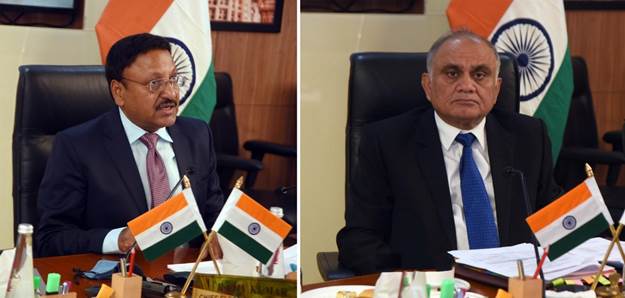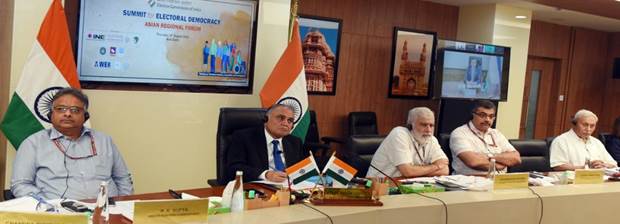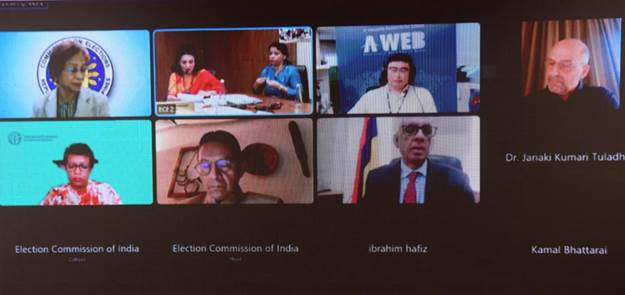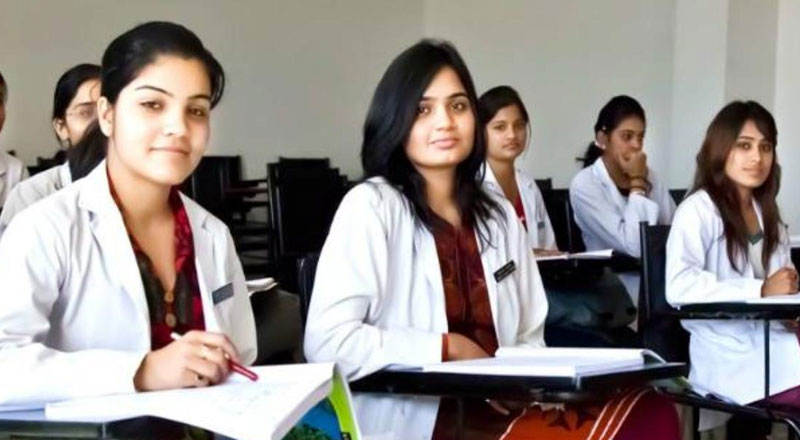The Election Commission of India (ECI) hosted a virtual meet of the ‘Asian Regional Forum’ on the theme “Making our Elections Inclusive, Accessible and Participative” at Nirvachan Sadan today. The Regional Forum meet was a precursor to the “Summit for Electoral Democracy” to be hosted by the National Electoral Institute of Mexico in the coming month.

Chief Election Commissioner of India Shri Rajiv Kumar, in his keynote address said that democracy and democratic institutions flourish when all groups of people are fully represented. No democracy can ever be meaningful and aspirational, unless it is Inclusive for all citizens, Accessible without fear or favor and Participative despite differential social, political, economic vulnerabilities.
CEC exhorted all Election Management Bodies (EMBs) for a continuous self-evaluation and strengthening of their systems, to meet the rising expectations from citizens and deal with the emerging challenges during the electoral process. He added that the framework for assessment and so-called ranking of democracies by global evaluating agencies should be objective and contextual, factoring in the magnitude, socio, cultural & geographical context in which each country and EMB functions. Welcoming the idea for this global ‘Summit for Electoral Democracy’, Shri Rajiv Kumar said that integrity of elections and democracy go hand-in-hand and generate global peace, prosperity and stability.
Shri Rajiv Kumar in his address said that Inclusion must cover all manner of marginalized communities – those marginalized by region, geography, literacy, language, ethnicity, economy, gender, disability among others to ensure their voices are heard and they are able to express their voting rights. Access must be provided to these communities to ensure the entire process of casting a vote becomes easy and comfortable. Persons with Disabilities (PwDs) and senior citizens grapple with attitudinal bias, lack of access to information, infrastructural barriers and many more issues. He added that whenever a new technology is designed or a new service is adopted by the EMB, accessibility should be part of the design itself and not added on later as an afterthought. He further extended support to desiring EMBs in designing and strengthening various technological, legal and regulatory architecture.
CEC Shri Kumar while highlighting the daunting task of conducting elections in India, said that the Commission undertook a far sighted reform during the Covid-19 period by introducing the Postal Ballot facility for 80+ senior citizens, persons with disabilities and those who were COVID positive/suspect. He mentioned that over 7.7 million PwD voters and 15 million 80+ voters have been mapped by ECI for targeted interventions and meaningful outreach. ECI is constantly striving towards achieving 100 percent mapping of all PwD and senior citizen voters. The participation of women in the first Indian election was 78 million i.e. 45%. Over seven decades and 17 national elections later, women’s participation has exceeded that of men and the gender gap has not only closed but reversed to +0.17% in 2019. India has witnessed a 235.72% increase in female electors since the 1971 election.
Shri Rajiv Kumar cautioned the EMBs about the opportunities and challenges emerging from ever increasing outreach through social media which also assumes criticality in terms of legal, regulatory framework and limitations across geographies to address fake news/narratives and surrogate advertising.

Complimenting the EMBs for various initiatives taken by them for Accessible & Inclusive elections, CEC said that there is scope to explore the possibilities of remote voting for inclusion of migrant voters as well as marginalized voters to end barriers in the electoral processes more effectively.
Election Commissioner, Shri Anup Chandra Pandey, in his address said that issues of accessibility are universal and most marginalized groups face barriers to their participation in elections which has been further exacerbated by the COVID-19 pandemic. He urged all EMBs to make sustained efforts to engage and involve women, third gender, PwDs, senior citizens and other marginalized groups in the election process.

While emphasizing that electoral practices need to be inclusive, Shri Pandey mentioned noteworthy initiatives taken by the Election Commission of India over the years to ensure “No Voter is Left Behind” including ‘Basic Minimum Facilities’ at polling stations, All-women managed polling stations, separate queues & toilets for women, postal ballot facility, Braille EPIC, wheel chair facility with volunteers, transport to and from the polling station, a mobile app for Persons with Disabilities, recognizing transgender as third gender and creating an Accessibility Division within ECI among others.
Shri Pandey in his concluding remarks commended the Asia Regional Forum platform and participants for sharing their suggestions and innovative initiatives taken by respective Election Management Bodies towards participative, inclusive and accessible elections.
Welcoming the participants, Senior Deputy Election Commissioner Shri Dharmendra Sharma, said that ECI is proud to be associated with this forum. Across the globe, initiatives have been taken by EMBs to ensure inclusive, transparent and ethical elections. This forum provides an opportunity to share experiences and learn from each other.

A recorded message from Mr. Lorenzo C. Vianello, President, National Electoral Institute (INE) of Mexico was also shared with the participants. Representatives from Election Management Bodies of Mexico, Mauritius, Philippines, Nepal, Uzbekistan, Maldives, International IDEA, Association of World Election Bodies (A-WEB) and International Foundation for Electoral Systems (IFES) participated in the meet. Senior officials from Election Commission of India were also present during the meet.
This Asian Regional Forum (ARF) meet had two sessions. The first session on ‘Inclusive Elections: Enhancing Participation of Youth, Gender and Citizens in Remote Areas’ was co-chaired by the Chief Election Commissioner from Mauritius and Nepal. The second session on ‘Accessible Elections: Enhancing Participation of Persons with Disabilities & Senior Citizens’ was co-chaired by the Commissioner, COMELEC, Philippines and CEC of Uzbekistan.
As part of this ‘Global Summit for Democracy’, five Regional Forums namely Africa, America, Asia, Europe, and countries of the Arab States have been created. India hosted the Asian Regional Forum meet of the EMBs to reflect upon the changing geo-politics, emerging technologies and their use in election management in view of the challenges presented by COVID-19 pandemic.





